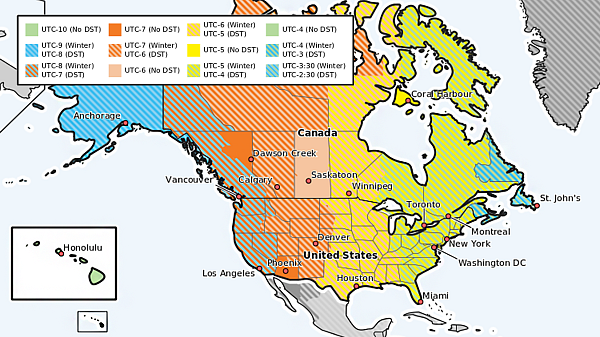Nov 4: Daylight Saving Time Ends in USA & Canada
In the United States, Canada, and Mexico's northern border cities, Daylight Saving Time (DST) ends on Sunday, November 4, 2018.


©timeanddate.com
Clocks will be set back 1 hour from 02:00 (2 am) to 01:00 (1 am) in each time zone.
DST in the US starts again on Sunday, March 10, 2019.
EU Might End DST Permanently
Europe ends DST Oct 28, 2018, always a week before the US.
Next year may be the last time Europeans set their clocks forward one hour, as the EU considers scrapping DST permanently in 2019.
Affects Most of the US
On November 4, the time will change in almost all of the United States.
Only the following areas do not change their clocks:
- Hawaii
- Arizona (some exceptions)
- American Samoa
- Guam
- Puerto Rico
- Northern Marina Islands
- US Minor Outlying Islands
- US Virgin Islands
DST Change in Canada
In Canada, clocks will change in almost all areas, except:
- Most of Saskatchewan
- Some locations in Québec east of 63° west longitude (e.g., Blanc-Sablon)
- Southampton Island
- Some areas in British Columbia
Mexico: Northern Border Cities Follow the US
Some northern Mexican border towns, such as Tijuana and Juarez (Ciudad Juárez), end DST on November 4, along with the US and Canada.
The rest of Mexico ends DST 1 week earlier, on Sunday, October 28, 2018—on the same date as what may be one of Europe's last joint DST changes.
The states of Sonora and Quintana Roo do not observe DST at all, so the clocks will not change there.
Other Countries and Territories
DST will also end on November 4 in Cuba, Bermuda, the Bahamas, Saint Pierre and Miquelon, and Thule Air Base in Greenland.
Upcoming DST changes worldwide
Several US States Want to Ditch DST
In March of 2018, the governor of Florida, Rick Scott, signed a bill to abolish seasonal time changes and install permanent Eastern Daylight Time (EDT) in the state. However, the bill has yet to be approved by the US Congress, and it is unclear if and when the body will address the matter.
Citizens of California will get a chance to vote on the state's DST policy on Election Day on November 6, 2018. If they vote to remove clock changes, both the US Congress and the state's legislature have to approve the measure.
Most of the New England states, namely Maine, Massachusetts, New Hampshire, and Rhode Island, have also recently been considering the idea to scrap DST. So far, however, time change policy has not been changed in any of them, so New England clocks will fall back together with most of the US on November 4.
The EU Might End DST Permanently in 2019
Set Clocks Back or Ahead?
To remember which way to set your watch, keep in mind one of these sayings: “Spring forward, fall back” or “Spring ahead, fall behind.” The clocks spring ahead (= losing 1 hour) in the spring when DST starts and they fall back 1 hour (= gaining 1 hour) when DST ends in the fall.